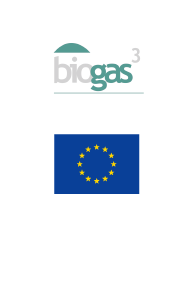Biogas 3
SUSTAINABLE SMALL-SCALE BIOGAS FROM AGRO-FOOD WASTE FOR ENERGY SELF-SUFFICIENCY![]()
Christophe Cotillon (Actia)
Tél. : 33 (0)1 44 08 86 15
Partners
Eleven partners representing 7 European countries: Germany (Renac), Spain (Ainia, Fiab), France (Actia, Ifip), Ireland (Irbea), Italy (Deiafa, Tecnoalimenti), Poland (Fundiko), Sweden (Swedish Institute of Agricultural and Environmental Engineering).
![]()
March 2014
![]()
24 months
Reference
Objectives
BIOGAS3 will promote the sustainable production of renewable energy from the biogas obtained of agricultural residues and food and beverage industry waste (agro-food waste) in small-scale concepts for energy self-sufficiency. This action will contribute to secure, sustainable and competitively priced energy for Europe by promoting new and renewable energy sources and supporting energy diversification.
Anaerobic digestion (AD) for biogas production is a proven technology that is well known in the municipal waste and wastewater treatment plants. It is commercially ready to use and has multiple benefits (energy savings, waste management cost savings, reduction of environmental impact, reduction of carbon footprint, etc.). The same technology can be applied to other organic waste such as agro-food waste. The motivation behind BIOGAS3 is based on the observation that, despite its multiple benefits, AD is not yet widely implemented in the agro-food sector, or its implementation varies extremely between the EU-27 member states. The small-scale AD concept (less than 100 kW), applied soundly in the appropriate locations, is a sustainable solution from the economic (energy savings due to self-consumption, waste management savings), energy (self-consumption and reduced losses due to near use) and environmental (reduced or zero transport costs for raw materials and digestate, CO2 emission abatement) point of view.
The project strategy is designed for the target group, the agro-food sector, which is at the same time the energy producer and the demand-side with the proposed scheme. First, the needs of end-users in terms of energy demand will be analyzed, as well as the difficulties they encounter when considering to install a biogas production facility. Second, the necessary tools to address these needs will be developed according to the gathered information, including business collaboration models, small-scale process design and promotion, energy demand management models, and training to build-up of skills, awareness and networking. Third, on-field actions will be implemented to promote this small-scale concept and to bring the developed tools to the end-users, including training sessions (face-to-face and on-line), workshops, webinars, website, etc. A specific programme of face-to-face activities with the most promising implementation sites will be carried out.
Actions




